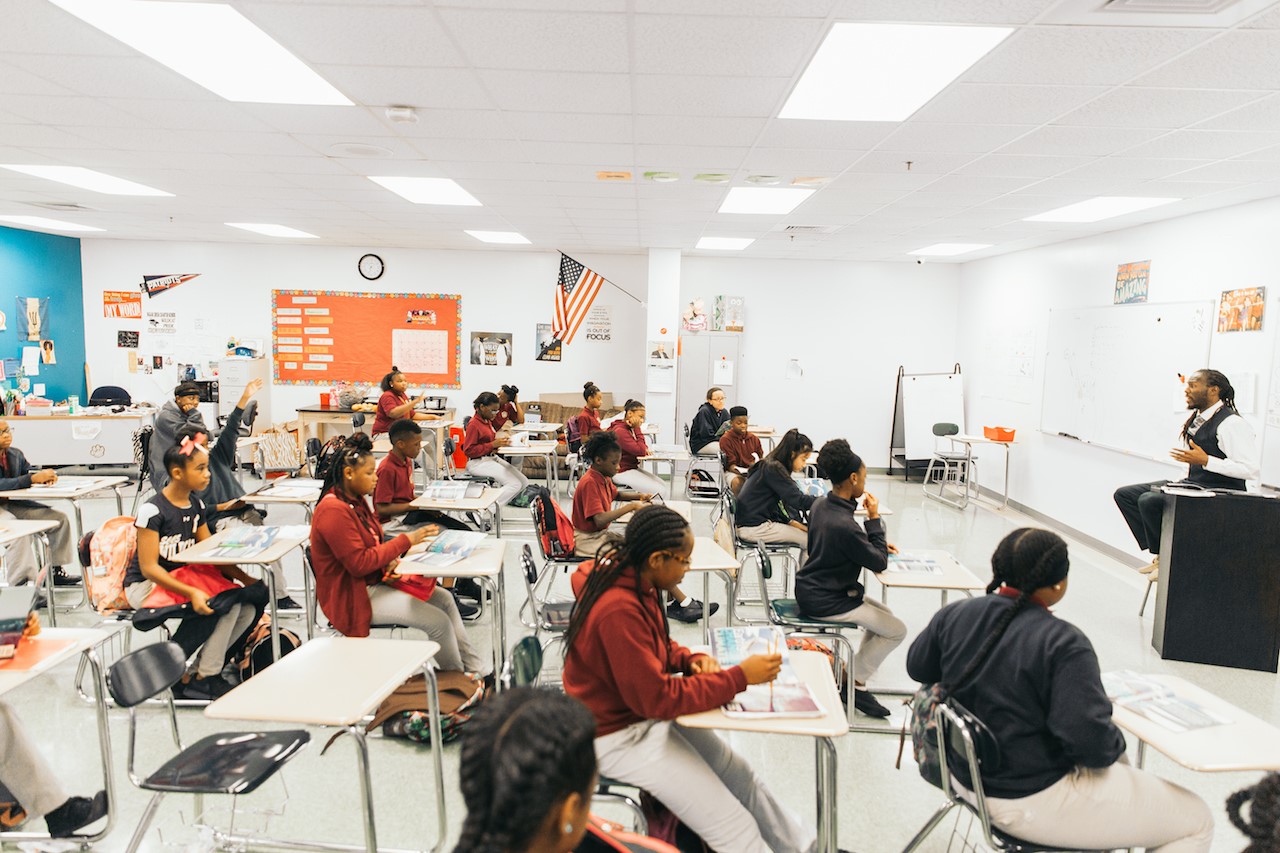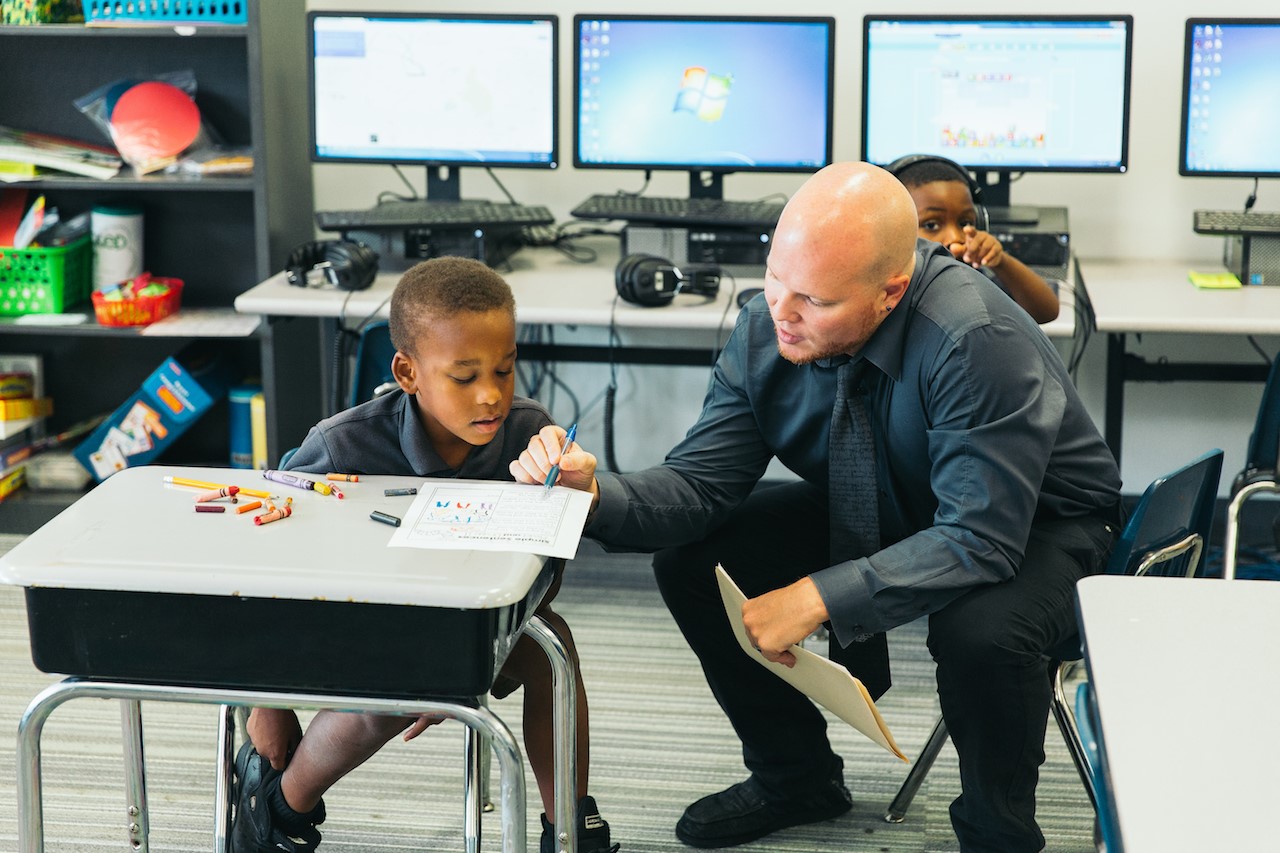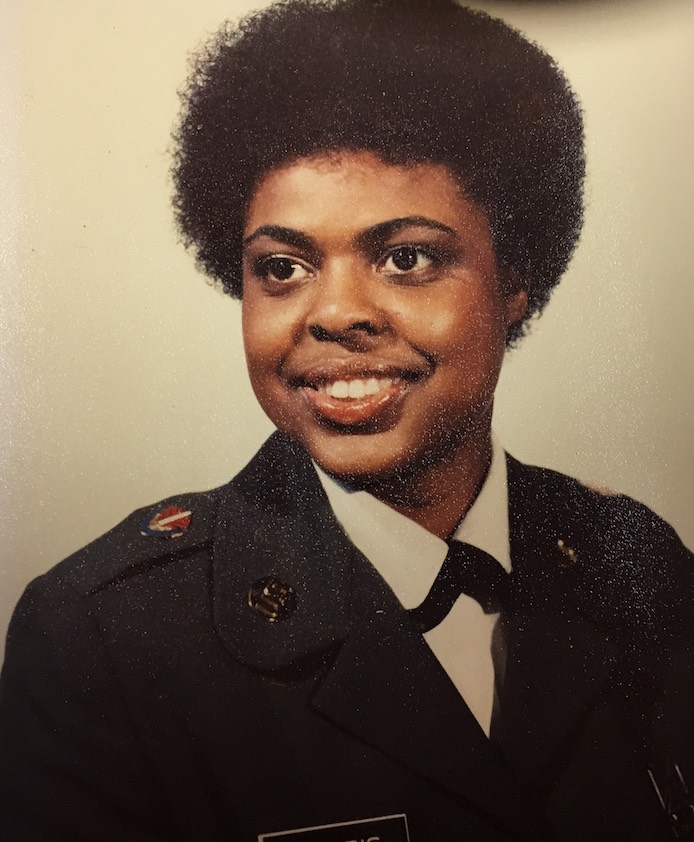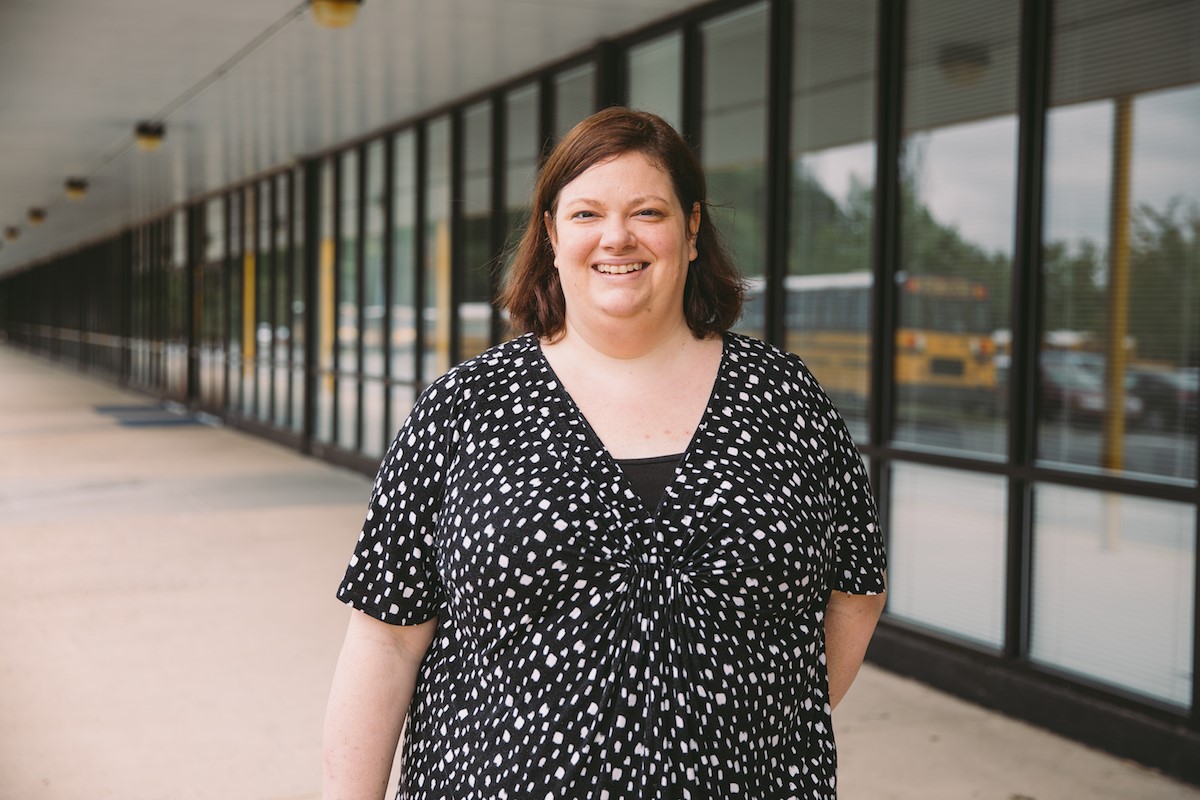Cheryl Turner: The charter school leader who inspired Movement School
This blog was originally published on Dec. 7, 2016
Cheryl Turner won't drive on the highway but she'll jump out of airplanes.
She's not European but she speaks fluent German.
Once upon a time, she really didn't like children. Today, she cares for 1,500 of them as principal of Sugar Creek Charter School in northwest Charlotte, N.C.
"If anybody told me, 18 years later, I would still be doing this…"
She stops, then remembers: She is still doing it.
(Learn more about Movement School here)
For much of her storied life, Turner has braved obstacles with the grit that comes from being raised by two military parents. She's tough, having worked as an Army broadcaster, and as a teacher in one of the country's largest urban school districts.
Each day she walks into Sugar Creek, she goes in shouldering a hefty responsibility — provide the kind of education that can fuel new opportunity for the students who roam the school's halls each day.

No wonder she's yearning for her first vacation in nearly three years.
But rest will come later. Right now, Turner, 63, is focused on keeping her school running and helping Movement Foundation start one of its own.
Sugar Creek is the model for the Movement School, a tuition-free charter the nonprofit Movement Foundation will open in west Charlotte next fall. Aiming to uplift communities where life below the poverty line is the norm, the school will empower children with a high-quality education in kindergarten through second grade.
Although the foundation is financing the launch of Movement School, Turner sits on its board. She's helped Movement navigate the charter school application process. She's loaned out some of her staff. And she's a source of inspiration — a living example of the tenacity (and endurance) it takes to educate students in one of Charlotte's most impoverished areas.
"The students who I believe are the most underserved in our educational system and get left in the margins are the students Cheryl is going after," says Garrett McNeill, director of the Movement Foundation. "She loves her staff and she loves her students. There's a steadiness with her."
Growing up German
Credit Turner's "steadiness" to a childhood that taught her the meaning of the word "resolve."
She spent five of her adolescent years in Germany, where her parents were stationed. When Turner was 8, her mother left the family. Turner's father became a single parent.
He was a black male, single father, infantry soldier in Germany with two children," Turner says.
Back then, "it was very unusual for an African-American male to be raising kids by himself. But my dad did."
He also fought in wars. Each time he deployed, Turner and her brother went to live with their maternal grandmother in the U.S. Their upbringing was good but the years Turner spent in Europe, she says, were the most significant of her life.
She marveled at the castles and centuries-old architecture. She immersed herself in the culture and learned the language. There were other things she couldn't ignore: She was a black girl in a predominantly white country. She stuck out. A lot.

"In those days, there weren't a whole lot of black folk in Germany," she says. "People would just point at us…and people wanted to touch and play with our hair. And they didn't mean any harm. We were just a foreign thing. Americans were a bigger problem to me."
Back in the states, she scoffed when an elementary school teacher told the class that Plantation Era slaves were "happy" to be in captivity. As a high school sophomore in New Jersey, she and her classmates were held hostage in their school for three days — the unwitting casualties of a race-fueled conflict between neighborhood blacks and Italians.
"They took over the school. They didn't do anything to us; they just wouldn't let us leave," Turner recalls. "I still, to this day, don't know what it was about.”
When Turner was in middle school, she sat in on college classes with her mother. Turner stood out then, too. She was a preteen, answering a psychology professor's questions.
Years passed and her mother returned to the family for good. Turner witnessed both her parents earn college degrees later in their lives. They stressed the value of higher education. "I always knew that school was a 16-year process," she says. "There was just never any doubt."
There's no doubt for the kids at Sugar Creek, either.
Welcome to Sugar Creek
Dare to step foot on Sugar Creek's campus before 8 a.m., and you enter a microverse teeming with activity in all directions.
Parents escort children inside the sprawling complex off one of Charlotte's busiest streets. Teachers wait curbside to greet their pupils. Some students occupy the crosswalk for what appears to be as long as possible. Others scurry inside to their desks before the morning announcements.
In the main office, a receptionist greets a visitor with a notebook and pen. He's shadowing Turner and receives instruction to wait for the boss to show.
Five minutes don't pass before Turner walks in, clutching a Starbucks cup. She gives her "good morning" greetings and makes a beeline to her office.
First, she checks email — it's the best gauge for what's going on in her world, she says. This particular world has more than quadrupled in size in just as many years.

When Turner first came to Sugar Creek, it had 350 students. Now, it has 1,500 and counting. Its main campus — a renovated Kmart — has expanded like its student body. A high school opened in 2013 and instructs ninth through 11th graders at a former church about five miles away. A modular building on Sugar Creek's main property recently opened just to house the eighth grade class. And then there's the staff of more than 200.
"We're having some growing pains," Turner admits, but "we're a work in progress."
Critical thinking and character building
Before the last batch of students ever get to their desks, Turner struts into the main hall and starts popping her head into classrooms.
In one kindergarten class, students sit on the floor and give predictions about what they expect to happen to characters in a book. In another, a teacher helps second graders work through a math problem, keeping the "essential question" in mind.
Answering essential questions and critically thinking through processes are cornerstones of Sugar Creek's curriculum. But these kids don't learn just to learn.
They learn to live.

Among those living in the country's 50 largest cities, poor children in Charlotte have the worst chances of escaping poverty and scaling the socioeconomic ladder, according to a joint 2014 study from Harvard University and the University of California at Berkeley.
That's on top of statistics showing that over 60 percent of students in Charlotte attend majority-poverty schools, most of which are segregated by race, say researchers from the N.C. Poverty Research Fund at the University of North Carolina Chapel Hill.
Those disparities create wide gaps in student achievement. Most schools earning a failing or 'D' grade on the state's schools report card have student poverty rates of 50 percent or higher. That's in contrast to "A" and "B" schools, where poverty rates are 50 percent or less.
The way the data tells it, Sugar Creek's children face an uphill battle. But Turner's not interested in numbers.
Our goal is for our kids to be successful in life," she says. "It requires more than just the academics. We have to build character."
All Sugar Creek students take character education classes that start when they're in kindergarten and won't end until they graduate.
These classes cover everything from character traits (like generosity) to global citizenship, understanding the framework for poverty and code-switching. In high school, they start college readiness classes, where they're paired with a counselor who helps them with college applications, career exploration and preparing for the SATs.

"We have to expose our kids to a lot of things" and equip them with social and soft skills they'll need for life after high school, Turner says. "Language skills. Writing skills. The kinds of things people use to judge you without knowing you."
A lot of kids learn those cues and behaviors from their parents or families. But Sugar Creek serves a population that may not get that reinforced training at home.
This "whole-child approach" isn't merely to give students an edge, Turner says. "For our kids, this is survival."
Not part of the plan
To those who've known Turner longest, it might seem ironic to hear her speak so passionately about teaching. Ask her just a few decades ago and "except for the two I gave birth to, I would have said I didn't like children," she says.
Then, she got in the classroom. "I just turned out to be a natural at it," she adds. "I just innately understood how kids learned."
Still, a career in education was farthest from her mind when, after earning her bachelor's degree in government, she enlisted in the Army.
She spent five years as a television and radio journalist for American Forces Network (AFN) Europe, which broadcasts news to military personnel stationed abroad.
"It was way fun. Probably the most fun I had was jumping out of an airplane" for a story on parachutists, she says. She spent another five years at the now-decommissioned Fort Monroe in Hampton, Va., where she worked in the public affairs office.

Her military service ended when she gave birth to her first son, Vinton Ellis Jr. While on maternity leave, she received orders to deploy on an unaccompanied tour to South Korea.
"I was going to have to leave my son home for 13 months while I went overseas," she says. "He was a newborn. That just didn't work for me, so I opted out."
She stayed in Virginia and landed a marketing job at a firm that sold large-sized clothes for women. The company's founder launched a program called Achievable Dream, designed to teach low-income students in Hampton and Newport News how to play tennis so they could get scholarships. Turner became the program's point person and began her exploits in education.
'Trial by fire'
When the company's founder sold his firm to one based in Nashville, Turner, single and raising two sons (her youngest, Jamison, was born a few years earlier), decided not to follow.

"My dad had a home in Baltimore, where he was from. So that was a place I could go that wasn't going to cost me rent," she says.
As she prepared for the move, Turner read an advertisement in the Richmond Times-Dispatch newspaper. It promoted a program that trained people with college degrees to become teachers at Baltimore City Public Schools. She applied and was accepted into the first cohort.
"Seventy-five of us started and, two years later, there were two of us left," Turner says.
It was "absolute trial by fire," she says. "We got two weeks of training, then we got dumped in classrooms and we had to take 12 graduate credits at the same time."
She taught in the classroom for two years — earning her master's degree in the process — before she started training fellow teachers in the use of direct instruction, the practice of teaching students a specific skillset by demonstrating the content in lectures, videos and presentations.
While working with a company that helped with the training, she met the person who would recruit her for a special project in North Carolina: Starting a charter school. There was just one little hangup.
"I didn't know what a charter school was when I took this job," Turner says.

Charting the course
Nevertheless, she moved to Rocky Mount, N.C., and helped open Rocky Mount Preparatory School in 1997, the same year 33 other charters opened in the state. She became the school's assistant director. "Literally, we were in an office in the mall when I first got down here," she says. "It was different. It was a challenge."
Starting a school from scratch is tough — "there's just nothing there," she says. Now, pair that with reaction from people who felt charters took money away from public schools and handpicked their students.
"Apprehensive would be an understatement," Turner says. "We weren't well-liked in those days. I wasn't totally prepared for the animosity towards charters."

Things are better today, she says. Every so often, though, a charter winds up in the crosshairs of public and education officials.
Helping Turner navigate those land mines is former Charlotte Mayor Richard Vinroot, a longtime attorney and charter school advocate. They met when Vinroot toured Rocky Mount during his unsuccessful run for governor.
I was so impressed with it and so impressed with her," Vinroot says of Turner. "I came back to Charlotte and gathered some friends of mine…and we decided to create Sugar Creek."
Soon after the school opened, its founders decided it needed a new principal. Guess who.
"I really didn't want to be a principal but I thought, 'at least if you're the principal, you're the person who gets to make the decision about how time is spent and so you can make sure instruction is the most important thing that goes on in the building,'" Turner says. "So, I took the job."
Righting the ship
Even with Turner at the helm, Sugar Creek had a "rocky start," says Vinroot, who sat on the school's board until last year but continues to offer it legal assistance. "Education is not easy, and educating poor kids is even tougher."
About five years after its founding, Sugar Creek was "making it but we weren't different or any better than other public schools," he says. Over lunch, Vinroot and other Sugar Creek board members told Turner that "we ought to shut this thing down."
But after more discussion, the board realized Turner had been waiting on their endorsement to run the school the way she wanted. They gave her the go-ahead.
"She went all over the country, talking to people and learning about educating poor kids," Vinroot says. "(Sugar Creek) changed the curriculum, changed the whole approach. I give all the credit to (Turner) and the people who surrounded her. She inspires confidence."

Those qualities have earned her recognition as a charter schools authority. She served three years as a Senate-appointee to the N.C. Charter School Advisory Board. This year marks her fourth on the board, which reviews charter school applications and oversees their operations.
"She's the best administrator you've ever seen," Vinroot says. "She's a star."
Garrett McNeill, of the Movement Foundation, thinks so, too.
Months after Turner met Movement CEO Casey Crawford and learned of plans for the Movement School, she wound up helping the company complete the voluminous charter school application. It typically takes months to finish. Turner helped the foundation finish it in much less time.
"We just came together and attacked it," McNeill says. "I would have been lost…we would not have a school if it weren't for Cheryl. I've just seen so much in Cheryl: How much she loves those kids; how much she loves their families; how much they truly are her first priority."
'The least of these'
It's 9 a.m. and Turner is back in her office. She has a meeting with the school's athletic director and one of her 18 curriculum specialists. Their conversation hits a range of topics — the end of fall sports, students chewing gum in the high school gym, spending $3,700 on an activity bus.
An hour later, she's in a meeting with the school's development director to talk about fundraising and networking. An impromptu meeting follows at 11 a.m. with the school's behavioral specialist, just as she was ordering lunch.
It's fair to say Turner wears a lot of hats — really, all the hats.

You could tell her fingerprints are all over that school," McNeill says about his first impression of Turner.
"From staffing to hiring to students to transportation to lunch to playground, I don't know a single piece or part (of the school) that her fingerprints aren't all over."
But Turner won't take the credit for it. Instead, she gives adulation to another.
"We are blessed in the Lord," she says. "I honestly believe that I was called to this, and I know I have no idea what I'm doing but I'm being guided. These are the least of these and the Lord wants to see them be successful, as well."


